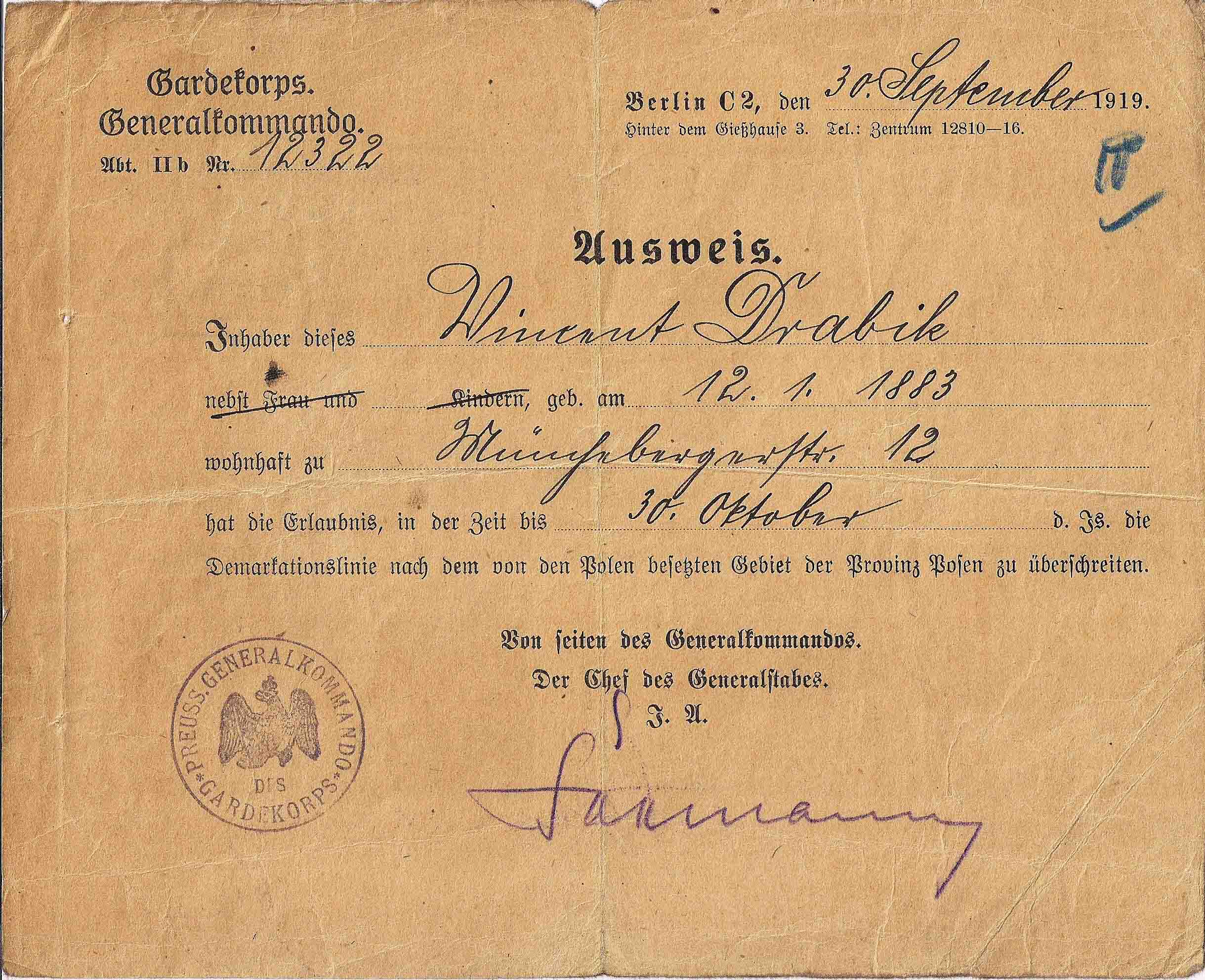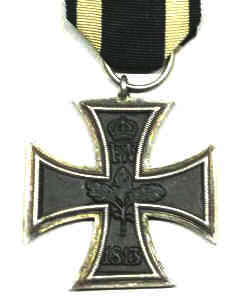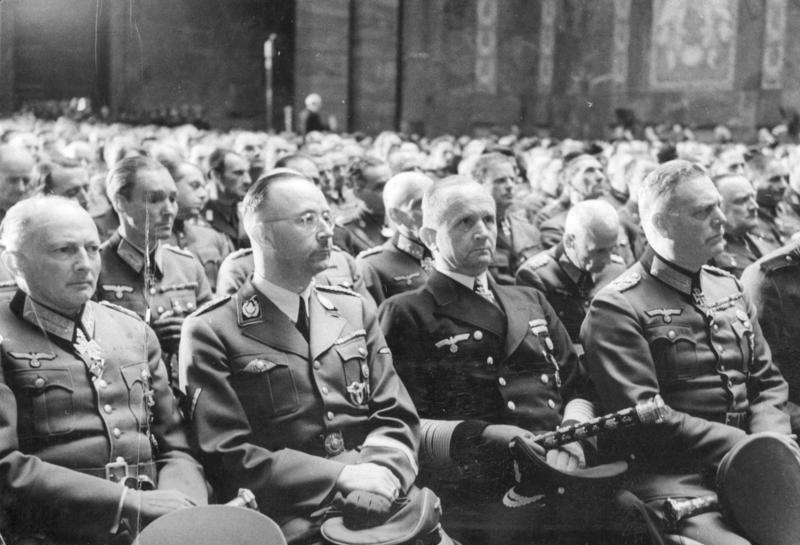|
Friedrich-Wilhelm Von Chappuis
__NOTOC__ Friedrich-Wilhelm von Chappuis (13 September 1886 – 27 August 1942) was a German general in the ''Wehrmacht'' during World War II who commanded the XXXVIII Army Corps. He was a recipient of the Knight's Cross of the Iron Cross of Nazi Germany. Chappuis was relieved of this post on 24 April 1942 and transferred to the ''Führerreserve''. He committed suicide on 27 August 1942. Awards * Knight's Cross of the Iron Cross on 15 August 1940 as ''generalleutnant is the Germanic variant of lieutenant general, used in some German speaking countries. Austria Generalleutnant is the second highest general officer rank in the Austrian Armed Forces (''Bundesheer''), roughly equivalent to the NATO rank of ...'' and commander of 15th Infantry Division * Knight of Honour of the Order of St. John References Citations Bibliography * {{DEFAULTSORT:Chappuis, Friedrich-Wilhelm Von 1886 births 1942 deaths People from Nakło County People from the Prov ... [...More Info...] [...Related Items...] OR: [Wikipedia] [Google] [Baidu] |
Province Of Posen
The Province of Posen (german: Provinz Posen, pl, Prowincja Poznańska) was a province of the Kingdom of Prussia from 1848 to 1920. Posen was established in 1848 following the Greater Poland Uprising as a successor to the Grand Duchy of Posen, which in turn was annexed by Prussia in 1815 from Napoleon's Duchy of Warsaw. It became part of the German Empire in 1871. After World War I, Posen was briefly part of the Free State of Prussia within Weimar Germany, but was dissolved in 1920 when most of its territory was ceded to the Second Polish Republic by the Treaty of Versailles, and the remaining German territory was later re-organized into Posen-West Prussia in 1922. Posen (present-day Poznań, Poland) was the provincial capital. Geography The land is mostly flat, drained by two major watershed systems; the Noteć (German: ''Netze'') in the north and the Warta (''Warthe'') in the center. Ice Age glaciers left moraine deposits and the land is speckled with hundreds of "finger l ... [...More Info...] [...Related Items...] OR: [Wikipedia] [Google] [Baidu] |
Knight's Cross Of The Iron Cross
The Knight's Cross of the Iron Cross (german: Ritterkreuz des Eisernen Kreuzes), or simply the Knight's Cross (), and its variants, were the highest awards in the military and paramilitary forces of Nazi Germany during World War II. The Knight's Cross was awarded for a wide range of reasons and across all ranks, from a senior commander for skilled leadership of his troops in battle to a low-ranking soldier for a single act of military valour. Presentations were made to members of the three military branches of the : the (army), the (navy) and the (air force), as well as the , the Reich Labour Service and the (German People storm militia), along with personnel from other Axis powers. The award was instituted on 1 September 1939, at the onset of the German invasion of Poland. The award was created to replace the many older merit and bravery neck awards of the German Empire. A higher grade, the Oak Leaves to the Knight's Cross, was instituted in 1940. In 1941, two higher grades ... [...More Info...] [...Related Items...] OR: [Wikipedia] [Google] [Baidu] |
German Army Personnel Of World War I
German(s) may refer to: * Germany (of or related to) **Germania (historical use) * Germans, citizens of Germany, people of German ancestry, or native speakers of the German language ** For citizens of Germany, see also German nationality law **Germanic peoples (Roman times) * German language **any of the Germanic languages * German cuisine, traditional foods of Germany People * German (given name) * German (surname) * Germán, a Spanish name Places * German (parish), Isle of Man * German, Albania, or Gërmej * German, Bulgaria * German, Iran * German, North Macedonia * German, New York, U.S. * Agios Germanos, Greece Other uses * German (mythology), a South Slavic mythological being * Germans (band), a Canadian rock band * "German" (song), a 2019 song by No Money Enterprise * ''The German'', a 2008 short film * "The Germans", an episode of ''Fawlty Towers'' * ''The German'', a nickname for Congolese rebel André Kisase Ngandu See also * Germanic (other) * Germa ... [...More Info...] [...Related Items...] OR: [Wikipedia] [Google] [Baidu] |
People From The Province Of Posen
A person ( : people) is a being that has certain capacities or attributes such as reason, morality, consciousness or self-consciousness, and being a part of a culturally established form of social relations such as kinship, ownership of property, or legal responsibility. The defining features of personhood and, consequently, what makes a person count as a person, differ widely among cultures and contexts. In addition to the question of personhood, of what makes a being count as a person to begin with, there are further questions about personal identity and self: both about what makes any particular person that particular person instead of another, and about what makes a person at one time the same person as they were or will be at another time despite any intervening changes. The plural form "people" is often used to refer to an entire nation or ethnic group (as in "a people"), and this was the original meaning of the word; it subsequently acquired its use as a plural form of per ... [...More Info...] [...Related Items...] OR: [Wikipedia] [Google] [Baidu] |
People From Nakło County
A person ( : people) is a being that has certain capacities or attributes such as reason, morality, consciousness or self-consciousness, and being a part of a culturally established form of social relations such as kinship, ownership of property, or legal responsibility. The defining features of personhood and, consequently, what makes a person count as a person, differ widely among cultures and contexts. In addition to the question of personhood, of what makes a being count as a person to begin with, there are further questions about personal identity and self: both about what makes any particular person that particular person instead of another, and about what makes a person at one time the same person as they were or will be at another time despite any intervening changes. The plural form "people" is often used to refer to an entire nation or ethnic group (as in "a people"), and this was the original meaning of the word; it subsequently acquired its use as a plural form of per ... [...More Info...] [...Related Items...] OR: [Wikipedia] [Google] [Baidu] |
1942 Deaths
Year 194 ( CXCIV) was a common year starting on Tuesday (link will display the full calendar) of the Julian calendar. At the time, it was known as the Year of the Consulship of Septimius and Septimius (or, less frequently, year 947 ''Ab urbe condita''). The denomination 194 for this year has been used since the early medieval period, when the Anno Domini calendar era became the prevalent method in Europe for naming years. Events By place Roman Empire * Emperor Septimius Severus and Decimus Clodius Septimius Albinus Caesar become Roman Consuls. * Battle of Issus: Septimius Severus marches with his army (12 legions) to Cilicia, and defeats Pescennius Niger, Roman governor of Syria. Pescennius retreats to Antioch, and is executed by Severus' troops. * Septimius Severus besieges Byzantium (194–196); the city walls suffer extensive damage. Asia * Battle of Yan Province: Warlords Cao Cao and Lü Bu fight for control over Yan Province; the battle lasts for over 100 ... [...More Info...] [...Related Items...] OR: [Wikipedia] [Google] [Baidu] |
1886 Births
Events January–March * January 1 – Upper Burma is formally annexed to British Burma, following its conquest in the Third Anglo-Burmese War of November 1885. * January 5– 9 – Robert Louis Stevenson's novella ''Strange Case of Dr Jekyll and Mr Hyde'' is published in New York and London. * January 16 – A resolution is passed in the German Parliament to condemn the Prussian deportations, the politically motivated mass expulsion of ethnic Poles and Jews from Prussia, initiated by Otto von Bismarck. * January 18 – Modern field hockey is born with the formation of The Hockey Association in England. * January 29 – Karl Benz patents the first successful gasoline-driven automobile, the Benz Patent-Motorwagen (built in 1885). * February 6– 9 – Seattle riot of 1886: Anti-Chinese sentiments result in riots in Seattle, Washington. * February 8 – The West End Riots following a popular meeting in Trafalgar Square, London. * F ... [...More Info...] [...Related Items...] OR: [Wikipedia] [Google] [Baidu] |
Siegfried Haenicke
Siegfried is a German-language male given name, composed from the Germanic elements ''sig'' "victory" and ''frithu'' "protection, peace". The German name has the Old Norse cognate ''Sigfriðr, Sigfrøðr'', which gives rise to Swedish ''Sigfrid'' (hypocorisms ''Sigge, Siffer''), Danish/Norwegian ''Sigfred''. In Norway, ''Sigfrid'' is given as a feminine name. official statistics at Statistisk Sentralbyrå, National statistics office of Norway, http://www.ssb.no; Statistiska Centralbyrån, National statistics office of Sweden, http://www.scb.se/ The name is medieval and was borne by the legendary dragon-slayer also known as . It did survive in marginal use into the modern period, but after 1876 it enjoyed renewed popularity d ... [...More Info...] [...Related Items...] OR: [Wikipedia] [Google] [Baidu] |
Erich Von Manstein
Fritz Erich Georg Eduard von Manstein (born Fritz Erich Georg Eduard von Lewinski; 24 November 1887 – 9 June 1973) was a German Field Marshal of the ''Wehrmacht'' during the Second World War, who was subsequently convicted of war crimes and sentenced to 18 years imprisonment. Born into an aristocratic Prussian family with a long history of military service, Manstein joined the army at a young age and saw service on both the Western and Eastern Front during the First World War (1914–18). He rose to the rank of captain by the end of the war and was active in the inter-war period helping Germany rebuild its armed forces. In September 1939, during the invasion of Poland at the beginning of the Second World War, he was serving as Chief of Staff to Gerd von Rundstedt's Army Group South. Adolf Hitler chose Manstein's strategy for the invasion of France of May 1940, a plan later refined by Franz Halder and other members of the OKH. Anticipating a firm Allied reaction should th ... [...More Info...] [...Related Items...] OR: [Wikipedia] [Google] [Baidu] |
Sigfrid Henrici
__NOTOC__ General Sigfrid Henrici (10 May 1889 – 8 November 1964) was a German general during World War II. During the invasion of Poland in 1939, Henrici was the commander of the 16th Infantry Division (motorised). He commanded XXXX Panzer Corps from November 1942 to October 1943, when he was severely wounded in Ukraine. He returned to service in 1944 and became again commander of the XXXX Panzerkorps in September, which he led until the end of the war. He was taken prisoner by the Red Army on 9 May 1945 and was released from Soviet captivity in 1955. He died on 8 November 1964. Awards * Iron Cross (1914) 2nd Class (14 September 1914) & 1st Class (24 December 1915)Thomas 1997, p. 268. * Clasp to the Iron Cross (1939) 2nd Class (20 September 1939) & 1st Class (20 May 1940) * German Cross in Gold on 13 August 1943 as ''General der Panzertruppe'' and commanding general of the XXXX. PanzerkorpsPatzwall & Scherzer 2001, p. 178. * Knight's Cross of the Iron Cross with Oak ... [...More Info...] [...Related Items...] OR: [Wikipedia] [Google] [Baidu] |
Hans-Valentin Hube
Hans-Valentin Hube (29 October 1890 – 21 April 1944) was a German general during World War II who commanded armoured forces in the invasions of Poland, France and the Soviet Union. In the course of the war, Hube led the 16th Infantry Division, XIV Panzer Corps, and the 1st Panzer Army rising to the rank of . He died in an air crash on 21 April 1944. Early career Hans-Valentin Hube was born on 29 October 1890, in Naumburg an der Saale, German Empire. Hube volunteered for military service in the Prussian Army in 1909, and served during World War I where he saw action during the Race to the Sea, and was awarded the Iron Cross 2nd Class and the Knight's Cross of the House Order of Hohenzollern. He had an arm amputated as a result of injuries sustained at the battle of Verdun. In 1918, following the end of the war which ended with the German Empire's defeat and subsequent collapse, Hube briefly served with the right-wing ''Freikorps'' paramilitary during the instability. Hube ... [...More Info...] [...Related Items...] OR: [Wikipedia] [Google] [Baidu] |
Ernst-Eberhard Hell
Ernst-Eberhard Hell (19 September 1887 – 15 September 1973) was a German general in the Wehrmacht during World War II. He commanded several divisions and later an army corps. He was a recipient of the Knight's Cross of the Iron Cross with Oak Leaves of Nazi Germany. Hell surrendered to the Soviet forces in August 1944 during the Soviet Jassy–Kishinev Offensive (August 1944). He was held in the Soviet Union as a war criminal until 1955. Awards and decorations * Iron Cross (1914) 2nd Class (11 September 1914) & 1st ClassThomas 1997, p. 266. * Military Merit Order, 4th class with Swords (Bavaria) * Military Merit Cross, 3rd class with War Decoration (Austria-Hungary) * Silver Liakat Medal with Sabres * Ottoman War Medal (Turkish: ''Harp Madalyası''; "Gallipoli Star", "Iron Crescent") * Clasp to the Iron Cross (1939) 2nd Class (12 May 1940) & 1st Class (17 May 1940) * German Cross in Gold on 14 June 1942 as ''General der Artillerie'' and commander of VII Army CorpsPatzwall ... [...More Info...] [...Related Items...] OR: [Wikipedia] [Google] [Baidu] |


_1938.jpg)

